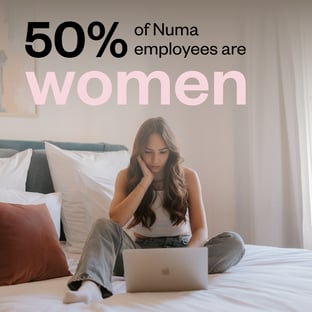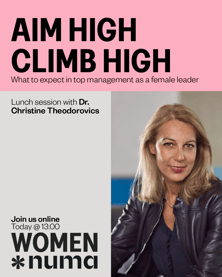From the gender pay gap to underrepresentation in leadership to battling stereotypes, women in professional settings have a lot to deal with on the daily–and this doesn’t even include their actual work. Sounds exhausting, right? 😮💨
(spoiler alert: it is, and numa decided to change that.)
Acknowledging the Gap For Women and Why It Matters
In the European Union, Women make up roughly half of the labour force1, but the wage gender gap is very real and has a big effect on the economy: something to the tune of €370bn per year according to one EU estimate.2 And in terms of leadership, across Europe, only about one in three executive roles are held by women.3
 In the dynamic and competitive landscape of the professional world, if we want to close this gap, it’s important to create an inclusive and empowering environment for all employees. And a key part of doing that is to start by acknowledging the unique challenges women face in traditionally male-dominated fields, companies are increasingly understanding the importance of initiatives that support and uplift their female workforce. To date, just over 50% of numa's employees are WOMEN and it's this very fact that prompted the desire to raise the bar at our very own company and inspired what eventually became the Women at numa (WAN) initiative.
In the dynamic and competitive landscape of the professional world, if we want to close this gap, it’s important to create an inclusive and empowering environment for all employees. And a key part of doing that is to start by acknowledging the unique challenges women face in traditionally male-dominated fields, companies are increasingly understanding the importance of initiatives that support and uplift their female workforce. To date, just over 50% of numa's employees are WOMEN and it's this very fact that prompted the desire to raise the bar at our very own company and inspired what eventually became the Women at numa (WAN) initiative.
How Women at numa Began
What started as impromptu meet ups between a group of female colleagues from different teams quickly turned into a regular call to get advice on navigating the business world as a woman. The call became a place for women in the company to help each other, share best practices and become more confident in their professional capacities. Over the weeks, the standing call evolved into an official initiative known as "Women at numa" (aka WAN).
WAN’s goal is to create a lighthouse for gender equality and female empowerment–and to improve numa overall as an employer and workplace. WAN founders started sending out polls to gauge the interest for female empowerment related sessions and it became apparent that there was a big opportunity to do more on this front. As we looked to expand the opportunities for our women colleagues to develop their skills in the areas they said were most important to them, we knew that the best resource would be other women with expertise in those areas. For every speciality you can think of, there's such a wealth of talented women with so much knowledge, and it's been exciting to reach out through different networks and invite speakers to share their insights,” explains numa Director of Guest Experience and head of Women at numa, Eva Klausner.
Evolving into a Platform for Growth
numa for Women now actively reaches out to influential women leaders across a broad range of fields like ESG, journalism, art, and more, who generously share their insights and know-how on diverse topics, touching on everything from financial investment strategies to navigating workplace challenges influenced by hormonal dynamics. To date, the group has now welcomed more than 10 speakers, including:

For 2024, numa is actively building out WAN as a strong knit community by planning even more speaker sessions, in-person events, educational content and interview sessions with numa leaders.
Want to be part of contributing to WAN too? If you (or someone you know 👀) are a woman and a specialist in your field who would like to present to WAN, get in touch to see if we can collaborate! 👩💻
Sources:
-
- World Bank (2022), Labor force, female (% of total labor force) - European Union, available from https://data.worldbank.org/indicator/SL.TLF.TOTL.FE.ZS?locations=EU
- European Commission (2022), Women's situation in the labour market, available from https://commission.europa.eu/strategy-and-policy/policies/justice-and-fundamental-rights/gender-equality/women-labour-market-work-life-balance/womens-situation-labour-market_en#:~:text=The%20economic%20loss%20due%20to,%E2%82%AC3.15%20trillion%20by%202050
- Statistisches Bundesamt (2023), Women in executive positions: Germany below EU average, available from https://www.destatis.de/Europa/EN/Topic/Population-Labour-Social-Issues/Labour-market/Female_Executive.html#:~:text=On%20an%20EU%20average%2C%20one,2023.